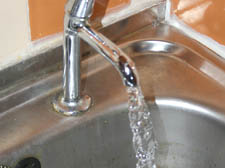|
|
 |
| |
 Money has been poured into persuading people that bottled water is healther Money has been poured into persuading people that bottled water is healther
than tap water
|
Will politicians have the guts to lose their bottle?
As the credit crunch bites, now is the time to save money by ditching bottled water in favour of the tap variety, argues Angela Sinclair
ARE London boroughs lagging behind other councils in the UK in introducing measures to discourage people from buying bottled water?
Last year, Liverpool municipal council banned bottled water from city offices after realising it was costing thousands of pounds yearly. Mayors worldwide are following suit. Boris, are you listening?
Why is bottled water so popular?
Andrea Harden, a water campaigner with the Polaris Institute, explains: “It has a perceived social value rather than a true market value – in other words, it is fashionable.”
I notice on the Underground how many younger people keep a bottle in their rucksack and often sip from it. As an oldie I was brought up to think that even if you were rather thirsty you waited till you got home and could pour yourself a glass of water from the kitchen tap.
The bottled water industry has put a lot of money and effort into persuading people that their products are pristine, pure and safe, and therefore healthier than tap water. They do so because it is amazingly profitable to them. It has been claimed that it yields higher profits than any other industry, including oil and gold.
Yet bottled water rarely has any advantage over tap water. In fact, around 40 per cent of it is merely tap water with a little extra filtration or added salts. Yet, allowing for regional price variations, it costs around 500 times what tap water does. Gallon for gallon it has often cost more than petrol.
While in many US states bottled water is checked only once a year, municipal supplies in western countries may be checked 300 times a month.
Most people have become increasingly aware of the need to protect our environment from further damage, one cause of which is our extreme wastefulness. Many are therefore willing to do what they can to reduce their personal waste. But many have not considered the extraordinary wastefulness of buying bottled water to drink, rather than being content with tap water.
Just think what the extra cost must be: manufacturing and labelling the plastic bottles, shipping them in crates across the Channel or from even further afield and then distributing them in trucks to retailers throughout the country.
Only about 17 per cent of the plastic bottles in which the water is contained are collected for recycling, and even then only a small proportion are reused. The suppliers find it cheaper to use virgin bottles.
Meanwhile, a growing proportion of glass bottles are indeed being recycled, but this is a very partial economy. Glass can last for decades or even centuries, so why destroy bottles, often after only a single use, only to manufacture identical replacements?
Encouraged by the credit crunch, I hope many individuals as well as councils will give up purchasing bottles of water, thus saving themselves considerable amounts of cash – and the burden of carrying the bottles home.
• |
 |
|
| |
| |
| |
| |
| |
|
 |
|